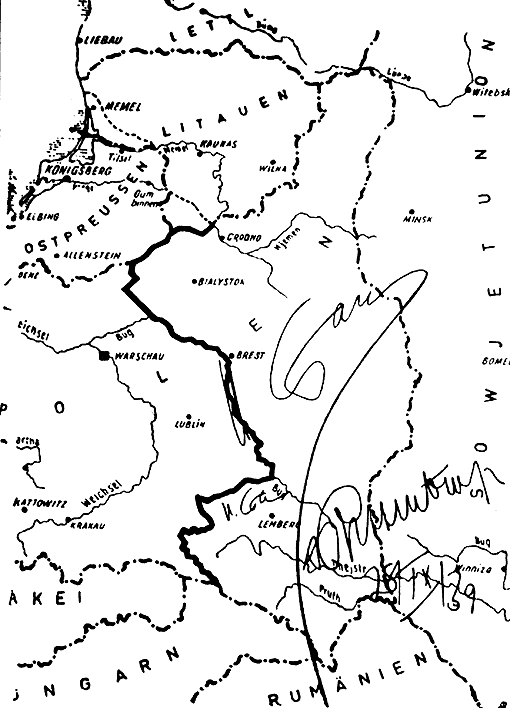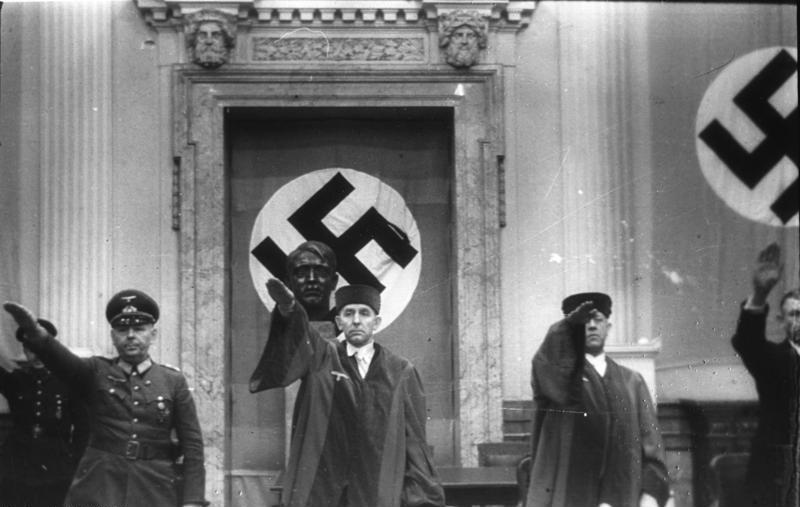|
Wawer Massacre
The Wawer massacre refers to the execution of 107 Polish civilians on the night of 26 to 27 December 1939 by the German occupiers of Wawer (at the time a suburb and currently a neighbourhood of Warsaw), Poland. The execution was a response to the killing of two German soldiers in a shootout by two petty criminals. An order to arrest at random any men inhabiting Wawer and the neighboring Anin between the ages of 16 and 70 was given and, as a result, 120 men, who were unrelated to the shootout, were gathered, and a show trial was hastily organized. 114 were declared "guilty" and sentenced to death, the others were spared to bury the dead. In total, 107 were killed and 7 survived, as they withstood the gunfire and were not finished off later. It is considered to be one of the first large scale massacres of Polish civilians by Nazi Germany in occupied Poland. Background Nazi Germany invaded and occupied Poland in September 1939. From the start, the war against Poland was intende ... [...More Info...] [...Related Items...] OR: [Wikipedia] [Google] [Baidu] |
Lebensraum
(, ''living space'') is a German concept of settler colonialism, the philosophy and policies of which were common to German politics from the 1890s to the 1940s. First popularized around 1901, '' lso in:' became a geopolitical goal of Imperial Germany in World War I (1914–1918), as the core element of the of territorial expansion. The most extreme form of this ideology was supported by the Nazi Party and Nazi Germany. was a leading motivation of Nazi Germany to initiate World War II, and it would continue this policy until the end of World War II.Woodruff D. Smith. The Ideological Origins of Nazi Imperialism. Oxford University Press. p. 84. Following Adolf Hitler's rise to power, became an ideological principle of Nazism and provided justification for the German territorial expansion into Central and Eastern Europe. The Nazi policy () was based on its tenets. It stipulated that Germany required a ' necessary for its survival and that most of the indigenous populations o ... [...More Info...] [...Related Items...] OR: [Wikipedia] [Google] [Baidu] |
Jerzy Jan Lerski
Jerzy Jan Lerski (''nom de guerre'': Jur; also known as George Jan Lerski; 1917-1992); was a Polish lawyer, soldier, historian, political scientist and politician. After World War II he emigrated to the United States, where he became a full professor at the University of San Francisco. Life Born 20 January 1917 in Lwów, Poland (now Lviv, Ukraine), Lerski studied law at Lwów University. In interwar Poland he joined the Stronnictwo Demokratyczne (Polish Democratic Party); he became known for his strong opposition to anti-semitic events. Jerzy Lerski first saw action in World War II during the 1939 Polish September Campaign. He fought in the Battle of Brześć Litewski in the rank of officer cadet (''podchorąży'', ensign). Taken prisoner by the Soviet Army during the Soviet invasion, he managed to escape from a train transport. He joined the anti-Soviet resistance but, with the NKVD (the Soviet Secret Police) actively looking for him, he escaped via Hungary to France, joining t ... [...More Info...] [...Related Items...] OR: [Wikipedia] [Google] [Baidu] |
General Government
The General Government (german: Generalgouvernement, pl, Generalne Gubernatorstwo, uk, Генеральна губернія), also referred to as the General Governorate for the Occupied Polish Region (german: Generalgouvernement für die besetzten polnischen Gebiete), was a German zone of occupation established after the invasion of Poland by Nazi Germany, Slovakia and the Soviet Union in 1939 at the onset of World War II. The newly occupied Second Polish Republic was split into three zones: the General Government in its centre, Polish areas annexed by Nazi Germany in the west, and Polish areas annexed by the Soviet Union in the east. The territory was expanded substantially in 1941, after the German Invasion of the Soviet Union, to include the new District of Galicia. The area of the ''Generalgouvernement'' roughly corresponded with the Austrian part of the Polish–Lithuanian Commonwealth after the Third Partition of Poland in 1795. The basis for the formation of the ... [...More Info...] [...Related Items...] OR: [Wikipedia] [Google] [Baidu] |
Collective Responsibility
Collective responsibility, also known as collective guilt, refers to responsibilities of organizations, groups and societies. Collective responsibility in the form of collective punishment is often used as a disciplinary measure in closed institutions, e.g. boarding schools (punishing a whole class for the actions of one known or unknown pupil), military units, prisons (juvenile and adult), psychiatric facilities, etc. The effectiveness and severity of this measure may vary greatly, but it often breeds distrust and isolation among their members. Historically, collective punishment is a sign of authoritarian tendencies in the institution or its home society. In ethics, both methodological individualists and normative individualists question the validity of collective responsibility. Normally, only the individual actor can accrue culpability for actions that they freely cause. The notion of collective culpability seems to deny individual moral responsibility. Contemporary systems ... [...More Info...] [...Related Items...] OR: [Wikipedia] [Google] [Baidu] |
Bochnia Massacre
Bochnia (german: Salzberg) is a town on the river Raba in southern Poland. The town lies approximately halfway between Tarnów (east) and the regional capital Kraków (west). Bochnia is most noted for its salt mine, the oldest functioning in Europe, built in the 13th century, a World Heritage Site and a Historic Monument of Poland. Since Poland's administrative reorganization in 1999, Bochnia has been the administrative capital of Bochnia County in Lesser Poland Voivodeship. From 1975 to 1998 it was a part of Tarnów Voivodeship. As of December 2021, Bochnia has a population of 29,317 and an area of . History Bochnia is one of the oldest cities of Lesser Poland. The first known source mentioning the city is a letter of 1198, in which Aymar the Monk, Latin Patriarch of Jerusalem, confirmed a donation by the local magnate Mikora Gryfit to the monastery of the Order of the Holy Sepulchre in Miechów. The discovery of major deposits of rock salt at the site of the present mi ... [...More Info...] [...Related Items...] OR: [Wikipedia] [Google] [Baidu] |
Massacre
A massacre is the killing of a large number of people or animals, especially those who are not involved in any fighting or have no way of defending themselves. A massacre is generally considered to be morally unacceptable, especially when perpetrated by a group of political actors against defenseless victims. The word is a loan of a French term for "butchery" or "carnage". A "massacre" is not necessarily a "crime against humanity". Other terms with overlapping scope include war crime, pogrom, mass killing, mass murder, and extrajudicial killing. Etymology The modern definition of ''massacre'' as "indiscriminate slaughter, carnage", and the subsequent verb of this form, derive from late 16th century Middle French, evolved from Middle French ''"macacre, macecle"'' meaning "slaughterhouse, butchery". Further origins are dubious, though may be related to Latin ''macellum'' "provisions store, butcher shop". The Middle French word ''macecr'' "butchery, carnage" is first recor ... [...More Info...] [...Related Items...] OR: [Wikipedia] [Google] [Baidu] |
Christmas
Christmas is an annual festival commemorating Nativity of Jesus, the birth of Jesus, Jesus Christ, observed primarily on December 25 as a religious and cultural celebration among billions of people Observance of Christmas by country, around the world. A Calendar of saints, feast central to the Christian liturgical year, it is preceded by the season of Advent or the Nativity Fast and initiates the season of Christmastide, which historically in the West lasts Twelve Days of Christmas, twelve days and culminates on Twelfth Night (holiday), Twelfth Night. Christmas Day is a public holiday in List of holidays by country, many countries, is celebrated religiously by a majority of Christians, as well as Christian culture, culturally by many non-Christians, and forms an integral part of the Christmas and holiday season, holiday season organized around it. The traditional Christmas narrative recounted in the New Testament, known as the Nativity of Jesus, says that Jesus was born in Bet ... [...More Info...] [...Related Items...] OR: [Wikipedia] [Google] [Baidu] |
Death Penalty
Capital punishment, also known as the death penalty, is the state-sanctioned practice of deliberately killing a person as a punishment for an actual or supposed crime, usually following an authorized, rule-governed process to conclude that the person is responsible for violating norms that warrant said punishment. The sentence ordering that an offender is to be punished in such a manner is known as a death sentence, and the act of carrying out the sentence is known as an execution. A prisoner who has been sentenced to death and awaits execution is ''condemned'' and is commonly referred to as being "on death row". Crimes that are punishable by death are known as ''capital crimes'', ''capital offences'', or ''capital felonies'', and vary depending on the jurisdiction, but commonly include serious crimes against the person, such as murder, mass murder, aggravated cases of rape (often including child sexual abuse), terrorism, aircraft hijacking, war crimes, crimes against hum ... [...More Info...] [...Related Items...] OR: [Wikipedia] [Google] [Baidu] |
Kangaroo Court
A kangaroo court is a court that ignores recognized standards of law or justice, carries little or no official standing in the territory within which it resides, and is typically convened ad hoc. A kangaroo court may ignore due process and come to a predetermined conclusion. The term may also apply to a court held by a legitimate judicial authority which intentionally disregards the court's legal or ethical obligations (compare show trial). A kangaroo court could also develop when the structure and operation of the forum result in an inferior brand of adjudication. A common example of this is when institutional disputants ("repeat players") have excessive and unfair structural advantages over individual disputants ("one-shot players"). Etymology The term ''kangaroo court'' is often erroneously believed to have its origin from the courts of Australia's penal colonies. The ''Oxford English Dictionary'' cites the first published instance of the term as from an American source, '' ... [...More Info...] [...Related Items...] OR: [Wikipedia] [Google] [Baidu] |
Max Daume
Max or MAX may refer to: Animals * Max (dog) (1983–2013), at one time purported to be the world's oldest living dog * Max (English Springer Spaniel), the first pet dog to win the PDSA Order of Merit (animal equivalent of OBE) * Max (gorilla) (1971–2004), a western lowland gorilla at the Johannesburg Zoo who was shot by a criminal in 1997 Brands and enterprises * Australian Max Beer * Max Hamburgers, a fast-food corporation * MAX Index, a Hungarian domestic government bond index * Max Fashion, an Indian clothing brand Computing * MAX (operating system), a Spanish-language Linux version * Max (software), a music programming language * Commodore MAX Machine * Multimedia Acceleration eXtensions, extensions for HP PA-RISC Films * Max (1994 film), ''Max'' (1994 film), a Canadian film by Charles Wilkinson * Max (2002 film), ''Max'' (2002 film), a film about Adolf Hitler * Max (2015 film), ''Max'' (2015 film), an American war drama film Games * ''Dancing Stage Max'', a 2005 game in ... [...More Info...] [...Related Items...] OR: [Wikipedia] [Google] [Baidu] |
.jpg)




.jpg)

